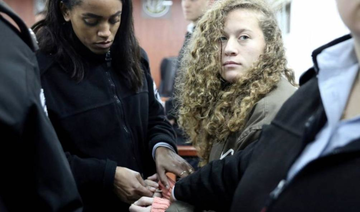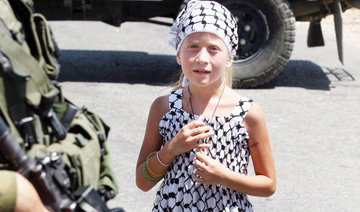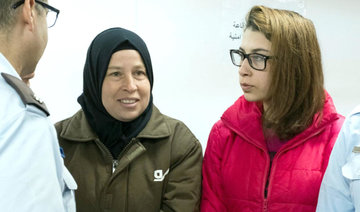NABI SALEH, West Bank: Palestinian protest icon Ahed Tamimi is to go on trial before an Israeli military court on Tuesday for slapping and punching two Israeli soldiers — an act Palestinians say embodies their David vs. Goliath struggle against a brutal military occupation and Israel portrays as a staged provocation meant to embarrass its military.
Israel’s full-throttle prosecution of Tamimi, one of an estimated 300 Palestinian minors in Israeli jails, and a senior Israeli official’s recent stunning revelation that he once had parliament investigate whether the blond, blue-eyed Tamimis are a “real” Palestinian family have helped stoke ongoing interest in the case.
The teen with the curly mane of hair, who turned 17 in jail last month, has become the latest symbol of the long-running battle between Palestinians and Israelis over global public opinion.
The case touches on what constitutes legitimate resistance to Israel’s rule over millions of Palestinians, already in its 51st year after Israel captured the West Bank, Gaza Strip and east Jerusalem in 1967.
Ahed Tamimi’s supporters see a brave girl who struck two armed soldiers outside her West Bank home in frustration after having just learned that Israeli troops seriously wounded a 15-year-old cousin, shooting him in the head from close range with a rubber bullet during nearby stone-throwing clashes.
Israel has treated Tamimi’s actions as a criminal offense, indicting her on charges of assault and incitement that could potentially land her in prison for several years.
Tamimi’s middle-of-the-night arrest from her home in December and her pre-trial court appearances, flanked by Israeli guards and looking impassive, have evoked a sense of history on a loop. Another generation of Palestinians seems locked in a cycle of protests and arrests by Israel, three decades after Palestinians staged their first uprising, throwing stones and burning tires in the streets.
Since the mid-1990s, several US-mediated rounds of Israeli-Palestinian negotiations on setting up a Palestinian state alongside Israel have ended in failure. Gaps in positions only widened in the past decade, as Israeli settlement expansion continued and the Palestinians failed to end a crippling political split between an internationally backed self-rule government in parts of the West Bank and the Islamic militant group Hamas which dominates Gaza.
Tamimi’s father Bassem, who threw his first stone at the age of 14 and was an activist in the first uprising, said he expects the military court will deal harshly with his daughter and that she might remain in prison for some time.
His wife, Nariman, is being prosecuted in the same December 15 scuffle in their village of Nabi Saleh and has been locked up alongside their daughter.
Despite the personal pain, the father said he is optimistic heading into the courtroom and that he believes he is witnessing progress.
He argues that his daughter’s case and the outpouring of support for her — more than 1.7 million people have already signed an online petition calling for her release — signal the beginning of the final chapter of Israel’s occupation.
“I see that we are starting the turning point in our history, to deal with our occupier and colonization in a different way,” said Tamimi. “Yes, there is a price (to pay) ... but this generation Ahed represents will be the generation of freedom.”
Yaakov Amidror, a former national security adviser to Israeli Prime Minister Benjamin Netanyahu, doesn’t believe the trial will hurt Israel’s image, saying that “those who are against Israel will be against it if she (Tamimi) is brought to court or if she is not.”
Amidror played down the findings of a recent Pew poll that indicated younger, liberal Americans are less supportive of Israel’s narrative than older generations. He portrayed young liberals as naive and said he expects their views to change as they get older, but added that Israel needs to work “very, very hard not to lose these people.”
In Nabi Saleh, Bassem Tamimi has used the interest in his daughter’s case to generate more support, saying he has hosted hundreds of foreigners in his home since her Dec. 19 arrest. His living room is decorated with several “Free Ahed” posters and one of Nariman.
On a recent morning, he met with volunteer observers from Switzerland, Sweden, Colombia, Argentina and Britain, going over the details of Ahed’s case and explaining his political views, including his support for a single, bi-national state in which Israelis and Palestinians enjoy equal rights.
The visitors, part of a program that typically has them touring the West Bank for three months, listened intently and jotted down some of what he said. “Your notes will be part of history in the near future,” he told them. “And we will put it in a museum.”
The visit ended with hugs, tears and a group photo on his porch, against the backdrop of Nabi Saleh, a village of about 600 members of the extended Tamimi clan.
After the group left, Bassem Tamimi got word that Hebrew graffiti had popped up on several walls in the village, but that teenagers were trying to cover up the threatening messages.
He rushed to the area, a few hundred meters (yards) from an army watchtower at the edge of the village, to try to preserve what he felt were valuable tools in the PR battle with Israel.
The first slogan called for the death penalty for Ahed. A second read: “The Tamimi family has no place in the Land of Israel.” A third warned: “Greetings from the retaliation branch of the IDF.”
As he took photos and video to be posted on social media, a dozen teenagers, some masked, headed toward the watchtower for weekly stone-throwing clashes with soldiers.
Worried that they might try to spray over the graffiti, Tamimi shouted, “Leave it, leave it,” as the group walked past him.
The boys began throwing stones toward a main road that separates Nabi Saleh from the Israeli settlement of Halamish, built in part on expropriated village land. Several soldiers arrived and fired stun grenades and rubber coated steel pellets.
From her second-floor balcony, Fattoum Tartier, a 41-year-old English teacher, kept an eye on her 11-year-old son, Hussein, in the street below to make sure he didn’t join the clashes.
“I want my children to live a good life, like everyone else in other parts of the world,” she said, her words punctuated by the booms from stun grenades.

Israeli military court to try Palestinian teen protest icon
Israeli military court to try Palestinian teen protest icon

© 2026 SAUDI RESEARCH & PUBLISHING COMPANY, All Rights Reserved And subject to Terms of Use Agreement.















